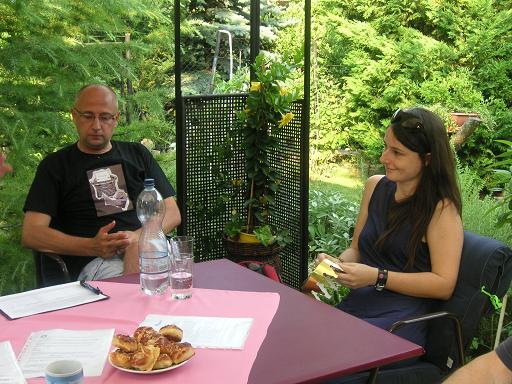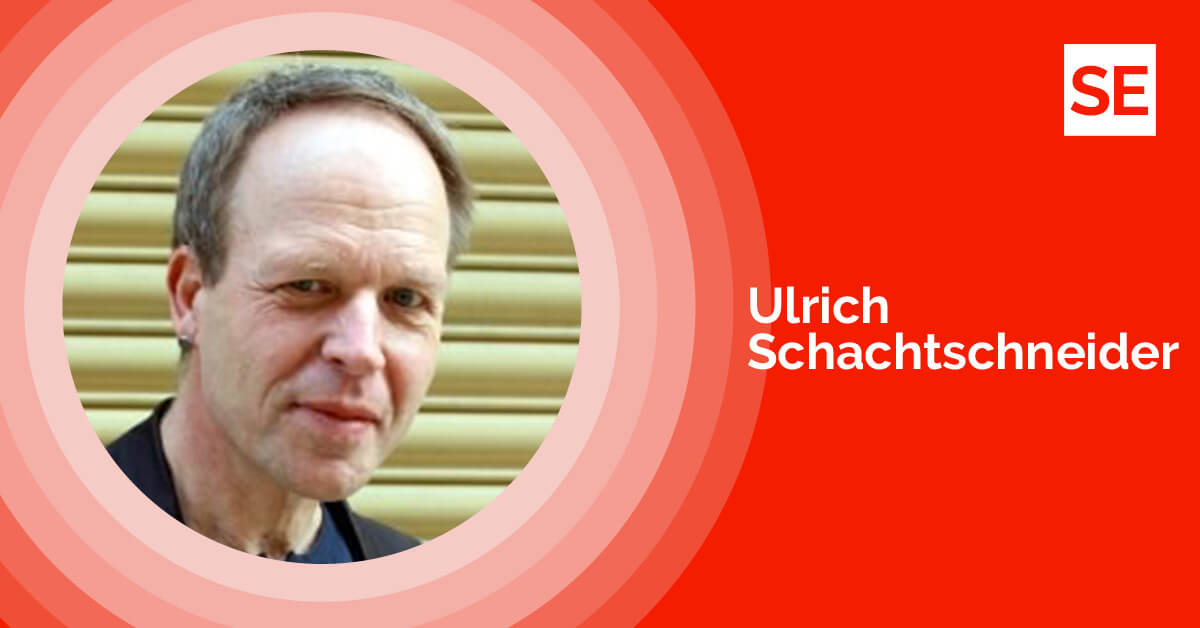The question posed in the title has been put forward by four authors: Bernd Fittkau and Gerd Lauermann as representatives of the “Hamburg Regionalgruppe Gemeinwohlökonomie” (Hamburg Regional Group of the Economy for the Common Good) and Ulrich Schachtschneider and Otto Lüdemann as proponents of the idea of an Unconditional Basic Income. Both the Economy for the Common Good and Basic Income movements are European movements. The ECG has been certified by the European Economic and Social Committee of the European Parliament as approach offering a “sustainable economic model geared towards social cohesion”. The Basic Income movement—after gathering some 300,000 signatures for a European Citizens’ Initiative in 2013—has established itself as a “European Network” with 25 countries represented.
In light of this, an important question then poses itself: what synergistic effects might arise out of cooperation between the two movements, which might address crucial European challenges? The assumption of such benefits lies in the particular opportunities that linking the ideas of the two movements present, opportunities for achieving both a sustainable and also a self-determined life, especially on a European level.
This will be made clear by:
- Specifying the common values of UBI and ECG in an ECG corporate culture,
- Guaranteeing social security via UBI as the foundation for a self determined life, even in daily company life.
- Proposals for a reasonable and future-proof tax system via value-creation taxes and eco-taxes,
- Giving impetus for a positive experience of European identity through Europe wide implementation.
The lack of precisely the three last aspects is the reason why, in spite of EU led efforts, attempts at greater integration are in tatters. The first critical step is for the EU to realize that its ability to fulfil its fundamental economic remit is contingent on having a social, sustainable and people-oriented Europe. Only on this basis, will a thoroughgoing reform be possible, such as proposed by Ulrike Guérot in her latest book: “Why Europe Needs To Become A Republic! A political Utopia”. In a Europe so constituted, unforeseen productive synergies between ECG and UBI could emerge.
Next, we try to explain the “essentials” of each movement. They can both be concisely stated:
- ECG: Optimize sustainability and the common good, instead of corporate profit maximization.
- UBI: enable a self-determined life for each individual.
Is there also something like a common goal for ECG and UBI? You could say: The common goal is relief from heteronomy!
- ECG aims to relieve corporations from the compulsion to maximize profits, driven by competitive pressure and the policy of growth at all costs, and instead prescribes the primary aims of sustainability and optimizing business for the common good.
- UBI aims to relieve the individual from economic pressures and enable a life with greater self-determination.
In spite of their differences, the two movements complement one another thanks to their common ideals. The ECG attempts to implement its goals by using a Common Good Balance Sheet, which uses a detailed Common Good Matrix to evaluate an individual company: The columns of the matrix set out fundamental values such as human dignity, solidarity, ecological sustainability, social justice as well as democratic participation and transparency, all of which serve as a basis for all commercial activity.
The columns of the matrix set out fundamental values such as human dignity, solidarity, ecological sustainability, social justice as well as democratic participation and transparency, all of which serve as a basis for all commercial activity.
These values are then cross referenced with so called “stakeholders” listed in the rows of the matrix, for example suppliers, creditors, workers, owners, customers;
but also products and services, business partners and the social environment. Negative criteria are also listed such as violation of ILO labour standards, dumping prices, and violating environmental regulations.
Use of the matrix gives a business a comprehensive evaluation of its sustainability and how well oriented its business practices are with the values of the ECG. Especially experienced evaluators support the workforce by including the workforce’s own assessment and certification of the result. Across Europe, approximately 350 businesses have been certified as ECG compliant and another 2000, or so, have expressed interest in being certified.
The UBI is founded on four principals, the basic income needs to be: universal, individual, without prerequisites, and high enough to allow for a reasonable participation in society.
As with the ECG, proponents of a UBI insist that its introduction needs to have democratic legitimacy. There are currently initiatives and networks advocating for a UBI on a local, regional, national, European and global level.
Preliminary conclusion: Different routes, mutual support, common goal: a transition economy.
The common goals of individual and societal self-determination and ecological sustainability are both pursued by ECG and UBI but via different routes. The two movements have the potential to provide mutual support by shifting basic conditions and creating a hospitable environment for the common goal of developing a transition economy.
Objections to introducing ECG and UBI in parallel:
- Wouldn’t the motivation of workers to follow the values and goals of their employers be undermined?
- Would workers be motivated to support an alternative, socio-ecologically sustainable economic system if their income is partially provided by the state and not from paid work?
- Theoretically, a UBI gives people more freedom to choose one way or another. But, what is even more important: individuals will decide for themselves which job opportunities are appropriate, not in spite of but precisely because of a basic income, they are freed from the pressure to accept a job on the grounds of economic necessity.
Objections from the point of view of business owners:
Would the pressure of funding a basic income for the whole of society force even ECG oriented companies to pursue profit maximization?
Even this concern proves to be unfounded: in an economy aiming to reduce economic growth, current production pressures and consumption habits would in part lose their meaning. General acceptance of sustainability goals and the guiding principle of the Common Good would shape long-term-decisions for production and consumption. The resulting reduction in economic activity would be no impediment for a basic income; the level of basic income could drop commensurately and encourage more subsistence and sufficiency.
In this sense Bernd Fittkau also conceives of the ECG in the sense of “transition economy”, an economy withdrawing from the current growth dependent model and moving towards a more ambitious “post-growth economy”.
The graphic represents a set of scales that can tip left or right, and in which the ECG serves as the “pointer” indicating the balance between integrating into current economic reality and meeting unavoidable future challenges. In such a “transition economy”, a basic income would express society’s willingness to fairly redistribute productive earnings.
A UBI would ideally be funded from a wide mix of sources.
Funding for a UBI would ideally come from a mix of different taxes. It would need to be a broad mix, as each additional form of tax would understandably meet with resistance from those affected. By distributing the burden onto many shoulders, a basic income is more likely to be accepted. A system of taxes based on the value creation process could be implemented at three stages:
Three stages for taxation:
- Beforehand,
- At the beginning/during,
- At the end of the value creation process.
1. Beforehand on the level of long-term investment decisions, these tend to precede the concrete implementation of the value creation process. A socio-ecological corporate tax reform could provide appropriate incentives.
2. At the beginning and during the value-creation chain by providing incentives via eco-taxes and tradable certificates.
3. At the end of the value-creation chain on the level of consumer choices by implementing a consumption tax that rewards socio-ecologically minded decisions rather than the current VAT.
As there are already many well-developed proposals for a consumption tax, we will focus on the first two propositions from the broad mix of funding sources. Specifically Otto Lüdemann’s suggestion of a Value Creation Tax in place of the current corporate tax and Ulrich Schachtschneider’s proposal for an “ecological basic income”.
Corporate tax reform: Incentivizing sustainable value creation instead of unchecked growth (Otto Lüdemann).
The proposed reform is based on the idea of a paradigm shift of the tax incentives provided by the current corporate tax structure. Instead of unchecked economic growth, economic activity that serves desirable social and ecological goals should be encouraged.
Corporate tax – in other countries known as: Unternehmenssteuern, impôt sur les sociétés, imposta sulle sociatà, impuesto sobre sociedades, vennootschapsbelastung… – is a fiscal tool that already exists Europe wide, and can be used to provide tax and investment incentives. Changing the name of the tax is not critical, what is important is a shift in the policy.
The Common Good Matrix presented above, intended for internal assessment by individual businesses, can serve as a conceptual basis for what would correspond to the “socio-ecological incentives” of the new corporate tax.
Certainly the values listed in the columns of the Common Good Matrix are fundamentally transferable to the reformed corporate tax. The question remains whether the Common Good Balance Sheet can serve as a blueprint for an external tax assessment and in what ways does it need to be adapted. A specific example of German legislation would be the regulation of “investment deduction”, which would need to be rewritten to only allow deductions when precisely defined socio-ecological conditions are met.
Positive consequences of Europe wide corporate tax reform include:
- The end of so called “legal” tax avoidance schemes,
- Positive effects on the environment,
- A democratization and increased dynamism of corporate culture.
The tax revenue of such a reformed corporate tax could contribute to funding the gradual introduction of a European Basic Income. In this way, the proposal of a Euro-Dividend made by the prominent social-ethicist and economist Philippe van Parijs has a renewed hope of being implemented.
Ecological Basic Income (Ulrich Schachtschneider)
An Ecological Basic Income (EBI) is a basic income wholly or partly funded by taxes on undesirable consumption of natural resources. Taxes should be imposed on consuming those natural resources, which can tolerate a limited degree of use but will not bear overuse or over-extraction.
Through the equal redistribution of these revenue streams (such as eco-taxes on raw materials, CO2 emissions, land use etc.) to the population, every citizen, old or young, rich or poor, will receive an “eco-bonus”, that is to say an “Ecological Basic Income”.
The tax would not apply to the end product, but instead to the beginning and end of the product life cycle, that is at the point of resource extraction and the disposal of material into natural sinks.
We are not dealing with an ecologically based discrimination of particular end products, but rather taxing particular forms of production and consumption, which require intensive use of natural resources. The tax is also progressive, wealthy people have a higher level of consumption and so as a rule a bigger environmental footprint. They require more living space per capita, drive more and buy more new products. They will therefore pay an above average level of tax but still only receive the flat rate of income; they will therefore be net contributors. Large families and the poor, on the other hand, will be net beneficiaries, numerous studies attest to this relationship. The ecologically based financing of the basic income also provides a socially acceptable incentive to live a low resource lifestyle, which is considered unavoidable in all ecological discourse, by encouraging the consumption and production of alternative less resource intensive products.
It is particularly this last consideration that connects the Ecological Basic Income with the ECG. Businesses that can produce with a smaller ecological footprint will not only have a moral but also an economic advantage in a system with an ambitious ecological tax.
Using this method, the values of the ECG, particularly pertaining to ecological impact, are met and without each consumer and each business needing to precisely balance and audit its activities.
Are there not serious considerations from the point of view of an ECG compliant business?
Can they hope to withstand the competitive pressure from conventionally run businesses? Yes they can, because the revenues raised go towards a basic income, this puts pressure on all businesses to operate in a socially acceptable way and use participative decision making processes to attract employees who have the freedom to say “no” to businesses that don’t meet their social, personal development or ecological values. The above-mentioned Euro-Dividend could also be well financed with eco-taxes, or revenue from the European Union Emissions Trading System.
In conclusion the question that we can now all hope to answer a little better is: how does the partnership between ECG and UBI look?
The couple is not yet in the safe harbour of a long-term relationship, but we have good reason to hope that it may yet become a dream partnership.
The END
About the autors
Otto Lüdemann is engaged in the “International Erich-Fromm-Society” and in the “Hamburg Basic Income Network”, organisations he represented when participating in the preparation and realisation of the European Citizens’ Initiative for Unconditional Basic Income in 2013 and in the foundation of UBI-Europe.
For the present contribution Otto Lüdemann cooperated with Bernd Fittkau and Bernd Lauermann from the “Regional Initiative Economy for the Common Good, Hamburg” and Ulrich Schachtschneider, researcher and activist in the matter of post growth economy and ecological basic income at Oldenburg.
Translation from German: Derek Leach, Hamburg






